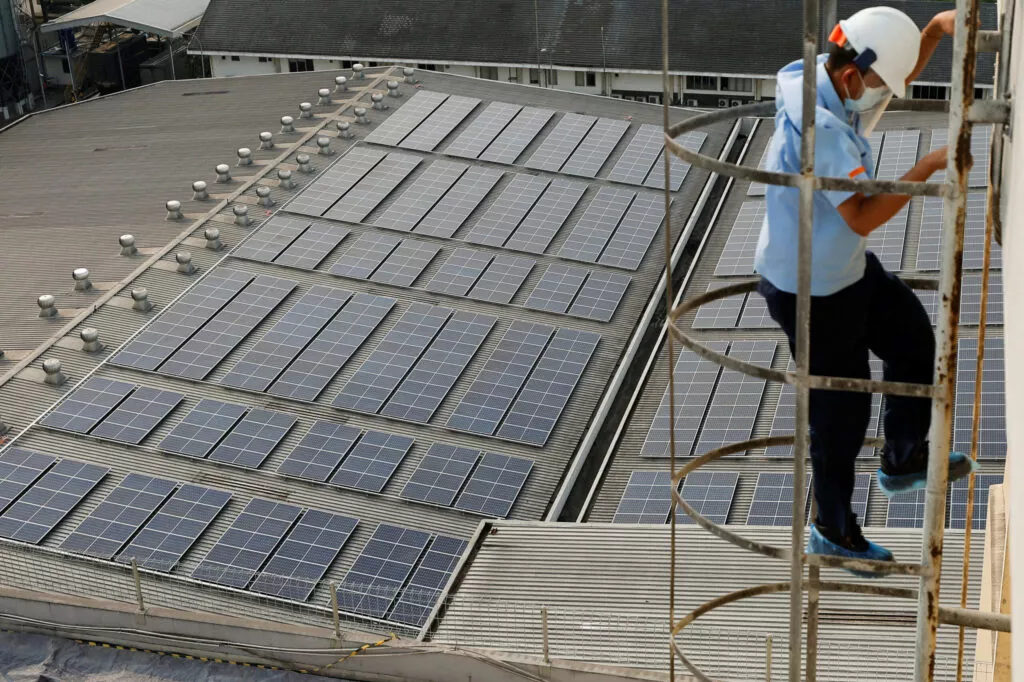Indonesia’s energy transition needs a decentralised approach
Indonesia continues to miss its energy transition targets. Persistent protections of fossil fuel interests have created a confusing policy environment within Indonesia’s centralised electricity sector, with the country’s energy transition hindered by artificial demand policies and monopolies over parts of the electricity sector. Through national funding for localised energy projects, Indonesia can realise the potential of renewable energy and make progress towards meaningful climate action.
Indonesia’s energy transition efforts are continuously being undermined by policy inconsistencies and missed targets. Despite government regulations setting a limit of coal use at 30 per cent of the total energy mix by 2025, state electricity company Perusahaan Listrik Negara’s (PLN) coal use target was 62 per cent during the same period.
Renewable energy, which was supposed to reach 23 per cent of Indonesia’s energy mix by 2025, only reached 13.9 per cent in December 2024, even falling short of the revised target of 17–19 per cent by 2025.
Government initiatives, like electric vehicle incentives and cofiring biomass with coal, are not doing enough to advance Indonesia’s energy transition. Electric vehicle policies fail to address that the electricity sector is Indonesia’s second largest emissions contributor, since the country favours coal for its electricity generation. And biomass cofiring is ineffective — 2.3 million hectares of land would be required to fire 52 power plants, potentially increasing emissions by 26.5 metric tonnes.
Indonesia’s inconsistent energy transition policies reflect efforts to protect fossil fuel interests amid growing transition pressures. While PLN has a monopoly over electricity distribution and transmission, generation is partially liberalised. The ‘take-or-pay’ scheme forces PLN to purchase all generated electricity or pay a fine, ensuring the profitability of coal-based electricity generation and trapping the electricity sector in a state of dependency on fossil fuels. This runs counter to renewable energy targets, exposing the conflict between policy goals and entrenched fossil fuel interests.
Indonesia’s electricity governance system stems from the nationalisation of Dutch electricity companies in the 1950s, with state monopoly persisting through the New Order era. While neoliberal policies shaped Indonesia’s electricity sector following the New Order’s collapse, total liberalisation through the 2002 Electricity Law received extensive public criticism, leading to its annulment by the Constitutional Court. This was replaced by partial liberalisation combined with PLN’s monopoly over electricity distribution and transmission through the 2009 Electricity Law, which remains in effect.
During the electricity sector’s liberalisation, Indonesia experienced a surge in coal production. Mining licences increased from 750 in 2001 to more than 10,000 in 2010, with 40 per cent for coal mines, partially accelerated by the government’s artificial electricity demand target. Former president Susilo Bambang Yudhoyono’s Masterplan for the Acceleration and Expansion of Indonesia’s Economic Development set an electricity demand target of 10,000 megawatts, which former president Joko Widodo increased to 35,000 megawatts in the National Strategic Project.
As coal-powered electricity generation soared, Indonesia’s electricity sector became inefficient, inflating electricity tariffs for consumers and obstructing renewable energy integration. The take-or-pay scheme created a contradictory energy environment where fossil fuel-powered energy remains profitable despite renewable energy being incentivised, hindering Indonesia’s energy transition.
Promoting Indonesia’s energy transition by restructuring its partially centralised electricity sector will be challenging, but policy options exist. Indonesia can encourage home-level solar electricity through microcredit and public–private partnerships with financial institutions, as well as through state-owned and local micro, small and medium enterprises. Indonesia can take inspiration from Bangladesh’s Solar Home Systems program, which provided low-carbon electricity to 20 million people, or around 12.5 per cent of Bangladesh’s population in 2018.
While similar efforts like the Rooftop Solar PV and Special Allocation Fund programs exist in Indonesia, they remain ineffective due to the government’s preference for large-scale energy enterprises. Revitalising these initiatives could significantly advance Indonesia’s renewable energy transition.
Indonesia could also integrate its centralised energy system with local energy transition schemes, as India has done with its Decentralised Renewable Energy program. While India initially focused on large-scale renewable energy, it later promoted small-scale rural initiatives through incentives and infrastructure, such as solar panels for agricultural water pumps.
Indonesia has similar potential for local-scale renewable energy. Yogyakarta has 4070 megawatt peak output of home-scale solar plants, 2010 livestock manure-powered biogas units and a 5 kilowatt waste-powered plant. East Nusa Tenggara and East Kalimantan also host initiatives like village solar power plants, with capacities of 40–100 kilowatt peak output, serving 100 to 200 houses each.
Most of these power plants were built through local initiatives to access government funding through the special allocation fund scheme. But this policy is often politicised and inaccessible to many citizens seeking to develop local-scale renewable energy. The Indonesian government must draw inspiration from India’s Decentralised Renewable Energy policy and empower village-owned enterprises to develop renewable energy by providing transparent and targeted funding programs.
Indonesia’s centralised electricity system, conflicting policies and inefficient governance hinder progress towards a sustainable energy future by protecting fossil fuel interests and creating barriers to renewable energy adoption. Indonesia must embrace decentralised renewable energy solutions that empower meaningful public participation in the national energy transition agenda. Shifting from a national fossil fuel-dominated system to a local energy model is essential to realising the potential of renewable energy and contributing to the global climate agenda.
source៖Eastasiaforum

